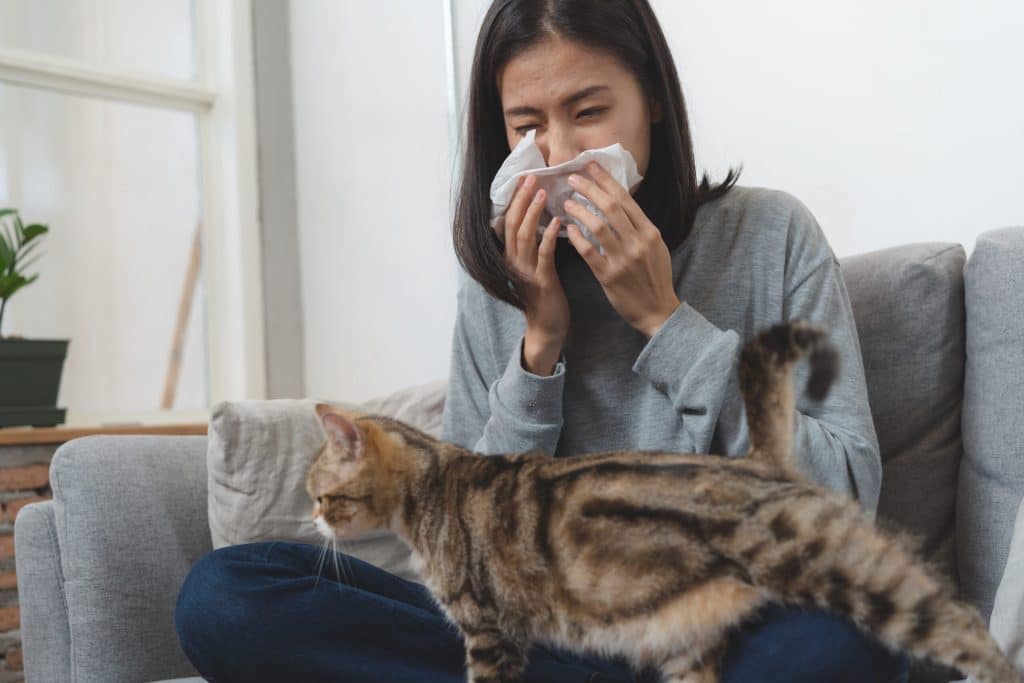The allergic reaction is the most common problem in our pets. Anaphylaxis is a harsh and potentially life-threatening reaction frequently seen in people who follow exposure to things like nuts, shellfish, and insect stings which will be affected dogs and cats.
Both pets and people are suspected of multiple allergens like insect bites or stings, drugs, foods, and environmental substances. The drugs like medications and vaccines and environmental substances like grass, house dust mites, pollen, and mold.
The allergic reactions have both manifestations and a multitude of causes. It is important for the owner of pets to be aware of the multiple symptoms of allergic reactions so that they will give medicines to them in a timely manner.
5 Signs your pet has allergic reactions and How to treat them:
Itchiness:

It is one of the most universal manifestations of allergies in pets or it will be either generalized or localized. The most common areas that are affected through the itchiness include:
- Face
- Armpits
- Hindquarters
- Limbs
- Ears
The pets having allergies are frequently observed scratching, licking, and bitching at these sites. As a result, the pets have inflamed skin and hair loss problems. Cats and dogs are facing allergies that might traumatize their skin which results in infection or open sores. It is important to seek the attention of a veterinary in order to keep your pets comfortable and stop skin infections.
Facial Swelling

If the owner sees the face of the pet as the swollen face then it should be the cause of both distress and alarm for them. Puffiness can create on the muzzle, ears, and around the eyes. A change in the appearance of the pets is more changeable and noticeable in the pets along with short hair coats.
The Areas that got swell as a result of allergic reactions are frequently itchy so the pet rubs or scratches its face and provides an alert to its owner regarding the problem of allergens. If your pet is facing these types of symptoms then you need to give medical attention rapidly.
Hives
Along with facial swelling, the hives are also recognized in dogs and cats with short fur. The owners of the pets with long coats or thick maybe now visibly identify hives but it will need to based on their sense of touch to detect the symptoms.
If the hives manifest is increased then it will also enhance the bumps throughout the skin of pets. This may or may not be assisted through itchiness. So that they are not life-threatening and hives need urgent medical treatment for the comfort of your pets.
Gastrointestinal Problems:
The most commonly linked with the allergy which includes foods, vomiting, and diarrhea will result from any allergen. Foods that are proteins based like beef and dairy products are most likely to cause this problem allergies in pets as compared to grains. Pets who become allergic to a specific food ingredient might have itchiness, diarrhea, and vomiting.
The diagnosis of food allergies is hectic and needs a prescription diet that consists of a novel protein source such as rabbit, venison, and duck or hydrolyzed protein. This will be less likely to create inflammation within the gastrointestinal tract.
Pets that have non-seasonal itchiness with diarrhea and vomiting must be evaluated for food allergies. Few pets along with food allergies only become itchy when gastrointestinal symptoms are not present.
Diarrhea and vomiting will also result from the anaphylactic reaction. When there is anaphylaxis then the immune system of the pets is activated to discharge multiple chemicals. These have a systematic effect on various areas of the body which include the intestinal tract and stomach.
Anaphylaxis/Shock
It is one of the most common and serious types of allergic reaction which cause the body to most shocking results which are:
- Collapse
- Difficulty breathing
- Loss of control of bowels and the urinary bladder
- Lower blood pressure
The most common reason for anaphylaxis in cats and dogs is vaccines. The pets that get vaccines should be monitored closely and they didn’t leave the unattended suddenly after the injections that have been administered. The following vaccination that monitors your pet for:
- Pale Gums
- Weakness
- Labored Breathing
- Vomiting
- Lethargy
If anaphylaxis creates then the symptoms are shown within a few minutes. If the owner cant treat it promptly then anaphylaxis will be fatal. It is necessary for pets to have any kind of anaphylactic reaction that is documented in the medical record.
In the long term, vaccinations must be given along with the precautions like the administration of reaction help medications above time and supervision afterward.
Treatment of Allergic Reactions
The management of allergic reactions is based on the multiple symptoms. If your cat or dog will be stung through the insect carefully remove the stinger if it is possible and apply a cool compress and ice to the area. Few pets who just only experience pain at the site of the bite. You need to always monitor your pets for the development of hives, signs of shock, facial swelling, and contact with veterinary care if the problem is increased.
Immediate Treatment Is Required
The pets who are suffering from the anaphylactic reactions will need immediate care and the treatments are:
- Antihistamines
- Epinephrine
- Intravenous Fluids
- Injectable Steroids
Intubation to balance the open airway and oxygen therapy are frequently important for pets who experience difficulty breathing.
Medications
Medications like steroids and antihistamines are the most typical way to deal with allergy symptoms. However, the common over-the-counter antihistamines are widely used in both pets and humans. It will never administer the medications to your pets without consulting with a veterinarian.
Avoidance:
The avoidance of allergens is the most protective way to keep your pets healthy and happy. Unfortunately, prevention is not always possible, and if you identify that your pet is having an allergic reaction. Then you need to contact the veterinary care ASAP.
Conclusion:
Allergic reactions are a common problem in pets, similar to humans. Pets can be allergic to various substances such as insect bites, drugs, foods, and environmental factors. It is important for pet owners to recognize the signs of allergic reactions, which include itchiness, facial swelling, hives, gastrointestinal problems, and anaphylaxis.
Prompt medical attention is crucial to alleviate discomfort and prevent severe complications. Treatment options include antihistamines, epinephrine, intravenous fluids, and medications like steroids. It is essential to consult a veterinarian before administering any medications. Avoiding allergens is the best preventive measure, but when reactions occur, seeking veterinary care is necessary for the well-being of pets.
You Might Also Like: Different Cabinets Designs That You Choose For Kitchen




